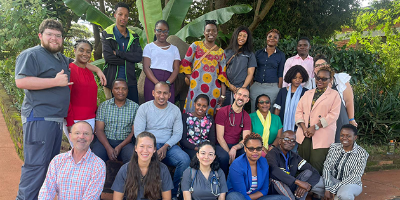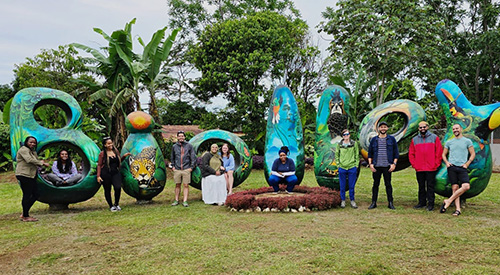Global Field Experience
Nigeria – June 1 - 15, 2025
If you require accommodations such mobility, diet, or any others, please contact the Office of Global Health to discuss options. As part of our commitment to equity, we are happy to try to identify solutions to accommodate your needs.
Please contact the Office of Global Health for more information:
globalnursing@umaryland.edu
UMSON, Room 480
The Office of Global Health is offering a global field experience to Costa Rica and Nigeria for undergraduate and graduate students. Funding is available, so those interested are strongly encouraged to apply!
This experience can count toward an elective in either NELC 452 (undergraduate-level international field experience) or NRSG 611 (graduate-level international field experience) and will count toward the field experience requirement for students enrolled in the Global Health Certificate.
Eligibility
- Open to students enrolled at the University of Maryland, Baltimore who have completed a public or global health course.
- Priority selection is given to the following:
- Students enrolled in the UMSON Global Health Certificate
- Students active in the Nurses for Global Health student group
- Students who have taken NELC 408 or NRSG 609 or other global health courses
- Students graduating in the spring of the current year are not eligible to participate (that is, if you graduate before the field study takes place, you are ineligible to participate).
- International students are encouraged to apply. We will support students through the visa process as best we can.
- Students without passports are also encouraged to apply if they can obtain a passport by April 30, 2025. The turnaround time for an expedited application is about six weeks, and the student is responsible for these costs.
Student Responsibilities
- Participants are required to attend three pre-trip sessions in March, April, and May (dates TBD).
- Participants are required to attend two post-trip debrief/integration sessions in July and August (dates TBD).
- Participants will contribute a minimum of $1,200 to cover the cost of meals and visas. If this cost is prohibiting you from applying, we still encourage you to apply, and we will try our best to figure out solutions.
- Participants are encouraged to bring extra money for incidentals and souvenirs.
- Participants will need to apply for the required visas to visit the country (if applicable based on citizenship).
Transparency About the Application Process
- Once all applications are submitted, a review committee composed of UMSON faculty will review the applications using a standardized rubric.
- Applications will be independently reviewed and scored by multiple reviewers to ensure fairness and then discussed as a group.
- Once acceptance decisions have been made, you will be contacted.
- Applicants have one week to confirm if they will be attending the trip or not.
- If a student declines acceptance, the next eligible student will be notified.
What to Expect for the Trip (Briefly)
Nigeria
 Nigeria is a West African country with a rich and diverse culture and over 200 languages. While English is the main language spoken in the country, indigenous languages are spoken, with a large population being multilingual. This is a country that is home to incredible tech startups, amazing food and art, and, of course, the famous Nollywood industry that has produced major blockbuster productions.
Nigeria is a West African country with a rich and diverse culture and over 200 languages. While English is the main language spoken in the country, indigenous languages are spoken, with a large population being multilingual. This is a country that is home to incredible tech startups, amazing food and art, and, of course, the famous Nollywood industry that has produced major blockbuster productions.
For this trip, we will dive deep into the health care system of the eastern part of Nigeria in Owerri, where will work with community organizations on the integration of mental health services into HIV care. Students will be involved in capacity-building activities, data collection, analysis, and community service. Students will gain a better understanding of differences in health systems from a strength-based lens.
In Nigeria, safety is of paramount importance, and we will take all necessary to keep everyone safe. Accommodations will be modest, and students will stay in shared rooms. We will do our best to ensure adequate access to Wi-Fi and electricity, but please be prepared for intermittent outages. You can expect driving on bumpy, dirt roads in a Landcruiser, temperatures in the 90s, and lots of rain, as this will be during the rainy season.
You’ll consume local food, which includes rice, garri/cassava, tomato-based stews, soups, and meats in addition to other local dishes.
Costa Rica
 Why Costa Rica?
Why Costa Rica?
Costa Rica is a global leader in sustainable health initiatives and environmental conservation. This trip offers a unique opportunity to explore global health systems while experiencing the country’s rich culture and biodiversity.
- Top Health Care Destination: Costa Rica’s universal health care system (Caja Costarricense de Seguro Social, CCSS) is ranked among the best in Latin America.
- Cultural Immersion: Engage with local communities and explore their health and wellness practices.
- Biodiversity Hub: Experience Costa Rica’s tropical rainforests, beaches, and wildlife in one of the most eco-friendly nations on earth.
What to Expect
- Hands-On Learning: Visit clinics, NGOs, and rural health settings to learn about health care delivery in resource-limited environments.
- Global Perspectives: Collaborate with local health care professionals to understand Costa Rica’s approaches to public health issues like maternal care, tropical diseases, and mental health.
- Personal Growth: Develop intercultural competency, leadership, and adaptability — skills that will make your resume stand out.
- Adventures Beyond the Classroom: Zip-line through cloud forests, visit volcanic hot springs, and hike breathtaking national parks.
Highlights of the Trip
- Field Visits: Observe health care programs addressing community wellness and environmental health.
- Sustainability Tours: Learn how Costa Rica maintains a carbon-neutral future through health care and environmental synergy.
- Community Engagement: Participate in meaningful service-learning projects supporting local populations.
- Wildlife and Culture:
- Explore Monteverde Cloud Forest and Manuel Antonio National Park.
- Tour San José, Costa Rica’s vibrant capital, filled with art, history, and local cuisine.